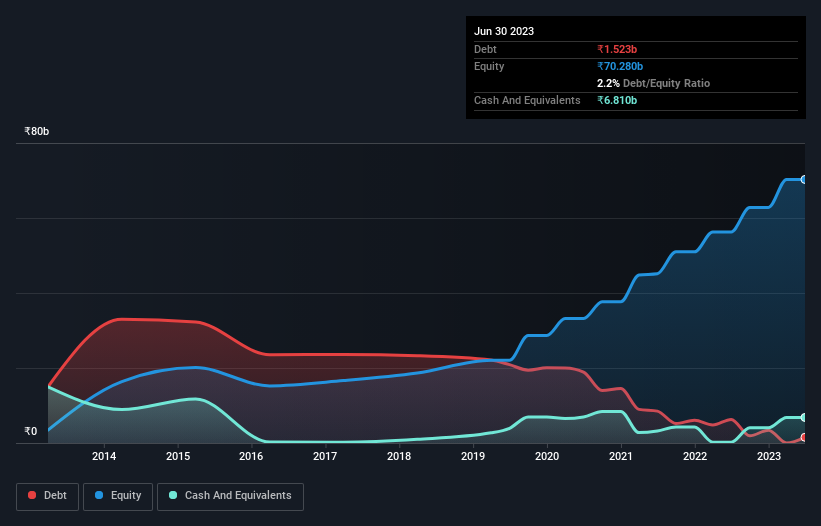The external fund manager backed by Berkshire Hathaway's Charlie Munger, Li Lu, makes no bones about it when he says 'The biggest investment risk is not the volatility of prices, but whether you will suffer a permanent loss of capital.' It's only natural to consider a company's balance sheet when you examine how risky it is, since debt is often involved when a business collapses. Importantly, Gujarat Gas Limited (NSE:GUJGASLTD) does carry debt. But the more important question is: how much risk is that debt creating?
Why Does Debt Bring Risk?
Generally speaking, debt only becomes a real problem when a company can't easily pay it off, either by raising capital or with its own cash flow. Ultimately, if the company can't fulfill its legal obligations to repay debt, shareholders could walk away with nothing. However, a more frequent (but still costly) occurrence is where a company must issue shares at bargain-basement prices, permanently diluting shareholders, just to shore up its balance sheet. Of course, debt can be an important tool in businesses, particularly capital heavy businesses. The first thing to do when considering how much debt a business uses is to look at its cash and debt together.
See our latest analysis for Gujarat Gas
What Is Gujarat Gas's Debt?
You can click the graphic below for the historical numbers, but it shows that Gujarat Gas had ₹1.52b of debt in March 2023, down from ₹6.29b, one year before. But it also has ₹6.81b in cash to offset that, meaning it has ₹5.29b net cash.

How Healthy Is Gujarat Gas' Balance Sheet?
Zooming in on the latest balance sheet data, we can see that Gujarat Gas had liabilities of ₹28.0b due within 12 months and liabilities of ₹11.0b due beyond that. Offsetting these obligations, it had cash of ₹6.81b as well as receivables valued at ₹10.2b due within 12 months. So its liabilities total ₹21.9b more than the combination of its cash and short-term receivables.
Of course, Gujarat Gas has a market capitalization of ₹314.4b, so these liabilities are probably manageable. Having said that, it's clear that we should continue to monitor its balance sheet, lest it change for the worse. Despite its noteworthy liabilities, Gujarat Gas boasts net cash, so it's fair to say it does not have a heavy debt load!
And we also note warmly that Gujarat Gas grew its EBIT by 11% last year, making its debt load easier to handle. When analysing debt levels, the balance sheet is the obvious place to start. But it is future earnings, more than anything, that will determine Gujarat Gas's ability to maintain a healthy balance sheet going forward. So if you want to see what the professionals think, you might find this free report on analyst profit forecasts to be interesting.
Finally, while the tax-man may adore accounting profits, lenders only accept cold hard cash. Gujarat Gas may have net cash on the balance sheet, but it is still interesting to look at how well the business converts its earnings before interest and tax (EBIT) to free cash flow, because that will influence both its need for, and its capacity to manage debt. Looking at the most recent three years, Gujarat Gas recorded free cash flow of 46% of its EBIT, which is weaker than we'd expect. That's not great, when it comes to paying down debt.
Summing Up
We could understand if investors are concerned about Gujarat Gas's liabilities, but we can be reassured by the fact it has has net cash of ₹5.29b. And it also grew its EBIT by 11% over the last year. So we don't think Gujarat Gas's use of debt is risky. The balance sheet is clearly the area to focus on when you are analysing debt. However, not all investment risk resides within the balance sheet - far from it. For example - Gujarat Gas has 1 warning sign we think you should be aware of.
At the end of the day, it's often better to focus on companies that are free from net debt. You can access our special list of such companies (all with a track record of profit growth). It's free.
New: Manage All Your Stock Portfolios in One Place
We've created the ultimate portfolio companion for stock investors, and it's free.
• Connect an unlimited number of Portfolios and see your total in one currency
• Be alerted to new Warning Signs or Risks via email or mobile
• Track the Fair Value of your stocks
Have feedback on this article? Concerned about the content? Get in touch with us directly. Alternatively, email editorial-team (at) simplywallst.com.
This article by Simply Wall St is general in nature. We provide commentary based on historical data and analyst forecasts only using an unbiased methodology and our articles are not intended to be financial advice. It does not constitute a recommendation to buy or sell any stock, and does not take account of your objectives, or your financial situation. We aim to bring you long-term focused analysis driven by fundamental data. Note that our analysis may not factor in the latest price-sensitive company announcements or qualitative material. Simply Wall St has no position in any stocks mentioned.
About NSEI:GUJGASLTD
Flawless balance sheet 6 star dividend payer.
Similar Companies
Market Insights
Community Narratives



